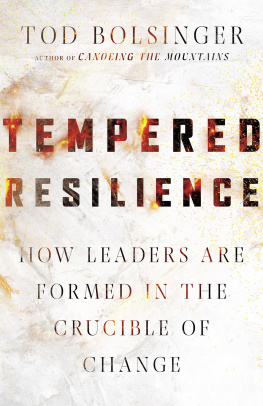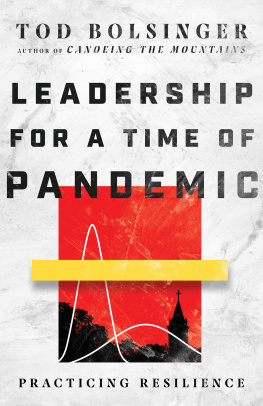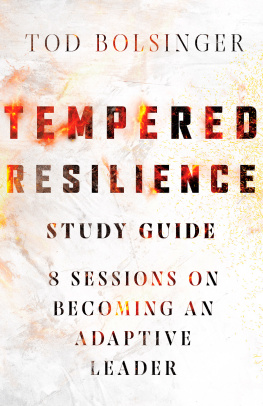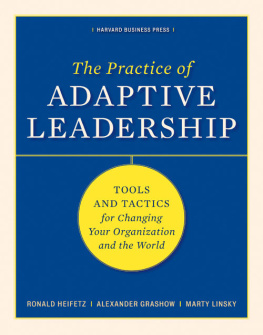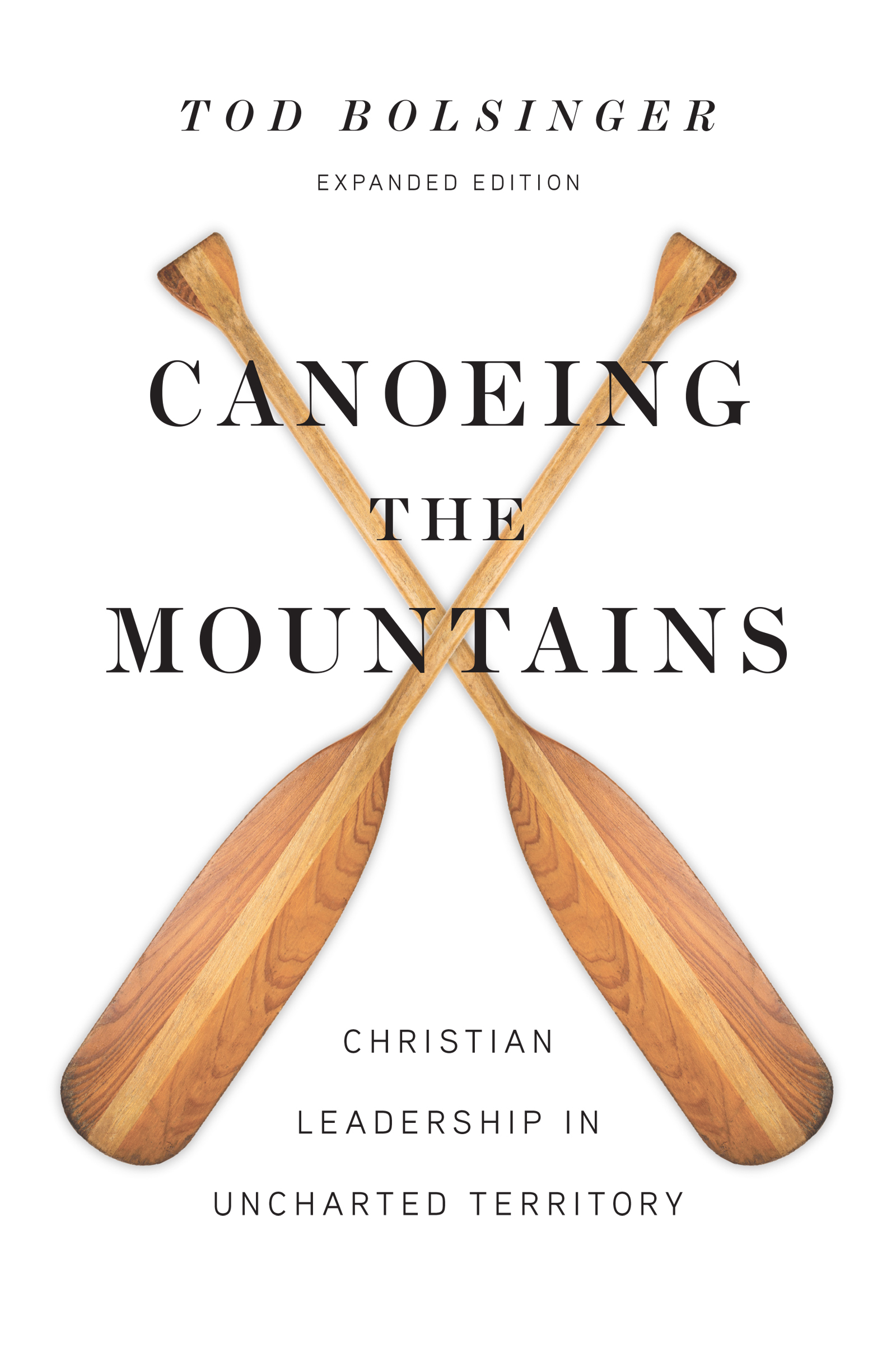InterVarsity Press
P.O. Box 1400, Downers Grove, IL 60515-1426
ivpress.com
2015 by Tod Bolsinger Study Guide 2018 by Tod Bolsinger
All rights reserved. No part of this book may be reproduced in any form without written permission from InterVarsity Press.
InterVarsity Pressis the book-publishing division of InterVarsity Christian Fellowship/USA, a movement of students and faculty active on campus at hundreds of universities, colleges and schools of nursing in the United States of America, and a member movement of the International Fellowship of Evangelical Students. For information about local and regional activities, visit intervarsity.org.
Published in association with Creative Trust Literary Group, 210 Jamestown Park, Suite 200, Brentwood, TN 37027, www.creativetrust.com.
Scripture quotations, unless otherwise noted, are from the New Revised Standard Version of the Bible, copyright 1989 by the Division of Christian Education of the National Council of the Churches of Christ in the USA. Used by permission. All rights reserved.
Figure 11.1 is provided by James Osterhaus.Used with permission.
While any stories in this book are true, some names and identifying information may have been changed to protect the privacy of individuals.
Cover design: Cindy Kiple
Interior design: Beth McGill
Images: marekuliasz/iStockphoto
ISBN 978-0-8308-7387-6 (digital)
ISBN 978-0-8308-4147-9 (hardcover)
ISBN 978-0-8308-4126-4 (paperback)
Library of Congress Cataloging-in-Publication Data
A catalog record for this book is available from the Library of Congress.
Dedicated to Brooks and Ali.
If I ever wonder where the Lewis and Clark leaders of the future
will come from, I only need look across the table on a
Sunday dinner when you both come home
from your many adventures.
Part One
UNDERSTANDING
UNCHARTED TERRITORY
The World in Front of You Is Nothing
Like the World Behind You
- 1 -
Seminary Didnt Prepare Me for This
If western societies have become post-Christian mission fields, how can traditional churches become then missionary churches?
Darrell Guder, The Missiological Context
Two Pastors Sit at a Bar...
One night after a long day of meetings, an older pastor let out a heavy sigh. He was nearing retirement, and we were working together on a project that was supposed to reorganize our entire denomination in order to help our church better minister in a changing world. And that changing world weighed on him. He remembered well how not that long ago life was different. He swirled his drink and said to me, You know, when I began my ministry in a church in Alabama, I never worried about church growth or worship attendance or evangelism. Back then, if a man didnt come to church on Sunday, his boss asked him about it at work on Monday.
Sociologists and theologians refer to this recently passed period as Christendom, the seventeen-hundred-year-long era with Christianity at the privileged center of Western cultural life. Christendom gave us blue laws and the Ten Commandments in school. It gave us under God in the pledge of allegiance and exhortations to Bible reading in the national newspapers. (I have a copy of the Los Angeles Times from December 1963 that has stories on the Warren Commission, the nine-thousand-member Hollywood Presbyterian Church and a list of daily Bible readings for the upcoming week. Can you even imagine the Los Angeles Times exhorting people to read their Bibles today?) It was the day when every city father laid out the town square with the courthouse, the library and a First Church of _______ within the center of the city.
For most of us these days are long gone. (For some of us, that is good news indeed. Did you notice the reference to man in my friends statement?) When cities are now considering using eminent domain laws to replace churches with tax-revenue generating big-box stores, when Sundays are more about soccer and Starbucks than about Sabbath, when Christian student groups are getting derecognized on university campuses, when the fastest growing religious affiliation among young adults is none, when there is no moral consensus built on Christian tradition (even among Christians), when even a funeral in a conservative beach town is more likely to be a Hawaiian style paddle out than a gathering in a sanctuary, then Christendom as a marker of society has clearly passed.
Over the last ten years I have had one church leader after another whisper to me the same frustrated confession: Seminary didnt train me for this. I dont know if I can do it. I just dont know... A number of pastors are ready to throw in the towel. Studies show that if given a chance to do something else, most pastors would jump at it. Reportedly, upwards of fifteen hundred pastors leave the ministry every month.
A couple of years ago I learned that three of my pastor friends around the country had resigned on the same day. There were no affairs, no scandals and no one was renouncing faith. But three good, experienced pastors turned in resignations and walked away. One left church ministry altogether. The details are as different as the pastors themselves, but the common thread is that they finally got worn down by trying to bring change to a church that was stuck and didnt know what to do. Their churches were stuck and declining, stuck and clinging to the past, stuck and lurching to quick fixes, trying to find an easy answer for what were clearly bigger challenges. What all three churches had in common was that they were mostly blaming the pastor for how bad it felt to be so stuck.
If only you could preach better!
If only you were more pastoral and caring!
If only our worship was more dynamic!
Please, pastor, do something! (That is what we pay you for, isnt it?)
And to make matters worse, the pastors dont know what to do either. As a seminary vice president, I am now charged with confronting this reality head-on. Our graduates were not trained for this day. When I went to seminary, we were trained in the skills that were necessary for supporting faith in Christendom. When churches functioned primarily as vendors of religious services for a Christian culture, the primary leadership toolbox was
- teaching (for providing Christian education)
- liturgics (for leading Christian services)
- pastoral care (for offering Christian counsel and support)
In this changing world we need to add a new set of leadership tools. And this applies equally well to Christians serving in leadership beyond the parish. The challenges of a changing world come even more rapidly in business, education and nonprofit leadership. And while this books primary audience is congregational leaders, I have added some material specifically for Christian leaders in other contexts.


